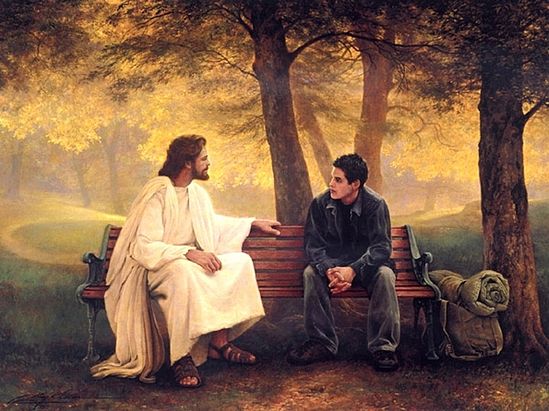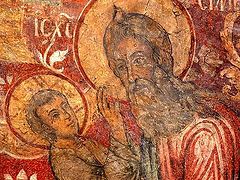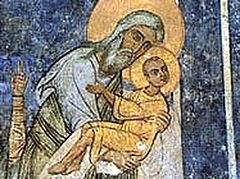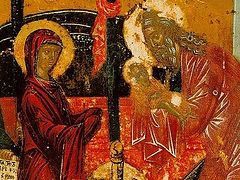From time to time we all, I believe, have an wish to look back and review our own life, or at least make a kind of summary: What good and important things have we done over all the years? Probably, we might ask the question in a different way: What good and interesting things have happened to us? We seem to have gained experience and achieved something, and so on and so forth. But there is hardly anything to be proud of—there must be nothing. For instance, that deed of mine was not perfect, and that work wasn’t flawless either. And then I failed everything. Then I try to recollect everything that happened to me—myriads of events. But I don’t always understand which is the most important, I can’t pick out only one thing—these events fight, compete and contest with one another. However, one reminiscence prevails over everything. It is a meeting. The crucial meeting in our life. The decisive, pivotal meeting. It’s our meeting with the Lord. It’s our personal feast of the Meeting of Lord in the Temple. We might have forgotten when it happened and under what circumstances, we may have no “icon” for this meeting, but if this day was in our life, if we had this meeting, it is for a reason. There is a point in which our life no longer unfolds horizontally but turns into a vertical line, where time crosses eternity; and eternity seems more transparent.
When pondering over that meeting, two ambiguous feelings penetrate me.
The first Joy is. I realize that I do not deserve such mercy from the Lord, but He showed it to me anyway. And I live by this mercy.
The second one is grief. Grief over people—those whom I don’t know well—who have never had that meeting with the Lord. I grieve more over those who are my friends, and even more over those who are very dear to me. And the anguish is extremely bitter. I look at them and feel fearful—I fear for both them and myself. I fear for them because there is no life without God, but rather a slowly creeping, imminent death. I fear for myself because looking at them I think: “And I could still be existing in that emptiness without any true sense and meaning, which is in fact human life without God.”
I do not try to find any explanation for what brings that ineffable, pure joy. I’m only grateful for it.
I cannot but try to explain what brings this grief. And I’m looking for this explanation, or I have looked for it, to be precise.
Could the Lord have passed by someone, paying no attention to him? Could anyone have failed to feel his love, care and concern? Does it sound fathomable? No, it does not. God loves everyone just as He created everyone; He came to this world, was crucified and died on the cross for our salvation. The Lord has given everyone hope for an eternal, joyful life full of light. There is no heart at which a meek, humble stranger, the Lord, has never knocked: this knock may be something delightful or something sorrowful. For someone this knock is a word—our whole life and everything that happens to us. However, the heart of some people opens and lets the Divine stranger in, while the heart of others remains firmly locked.
How can we understand why this happens? It’s a mystery. A mystery of the human heart. Decent, honest people, good husbands and faithful wives, outstanding leaders and responsible employees may not accept the existence of God for the rest of their lives, and remain indifferent towards Him, the One Who gave them the gift of life, called them into existence from nothingness, and sustains this existence. At the same time, Divine love may unexpectedly strike robbers, thieves, adulterous men and women, who are all denounced and despised, so that they immediately give up their sinful life, improve it and cleanse themselves of impurities, acquiring the image of God... What is this if not a mystery known only to Him, Who fashions the hearts of them all (Psalm 33:15)?
Only the Holy Spirit penetrates the depths of human heart. Only the Holy Spirit reveals to those He has chosen what they would later disclose to us. St. Theophan the Recluse, a pleaser of God who had the gift of discernment, wrote in his Thoughts for Every Day of the Year that the most is important for us is to fully realize this mystery. According to St. Theophan, if a man does not seek to indulge his passions and desires, is not greedy for fame and profit but seeks only the truth, he will soon find Christ, for only He is the Truth.
How truthful these words are and how much evidence for it we can find in our day-to-day life! A Pharisee, the son of a Pharisee (Acts 23:6) looked for the truth, strove after it and finally found it on his way to Damascus, where he hoped he would pursue the servants of the truth—then he turned into its most zealous defender. Pilate didn’t seek the truth; he didn’t need it and never identified it when the Truth humbly stood in from of him. Pilate would only ironically ask, “What is the truth?” (John 18:38), meaning that there are myriads of different truths, and none on them is real.
Could this explanation comfort and console us if we speak about our friends, relatives and all those who we love? Their meeting with the Lord just won’t take place, and there’s a real possibility that they will never meet Him. That explanation is often but little consolation... However this gives us no reason to grumble or think God is biased or unjust—it give us the clarity that we need so much.
What is more important, this explanation always instills hope in us. If we, mean, egotistical and self-absorbed people, find something for which we can love a person, can’t the Lord find something worthy in their heart that would push them to respond to His Divine grace? We shouldn’t demand that God do something today that is meant to happen tomorrow, or in one year, or in many years. As a fruit ripens to be eaten, an individual should mature for a meeting with Christ. How can we know the day, or the time, or the fullness of this maturity?
For instance, a friend of mine believes in God, prays to Him, relies on Him; in God he often finds his only consolation and help. But, at the same time, he believes in Him “in his own way”—rejecting both the Church and Christianity. Amazingly enough, when he tries to explain his faith, Christianity is the only faith similar to his religion. If I tell him about it he gets irritated and begins to argue. I’m anxious about him, I have no wish to argue. I realize there’s only one thing I can do—I can only pray. Since he is so close to Christ that he needs only to take a single step towards Him, my prayer may be the impulse that will make him take it. And what if he takes more than one step? What if I’m not the only one who prayed?
I again recall my own meeting of the Lord, how it happened. I could talk a lot about it; it was unexpected—that’s crucial. An hour, or a year, or a glimpse before it, no one could have ever foreseen what was in store for me, save the One Who, unlike me, expected this meeting. This meeting was the same in the lives of those I happened to know and for whom I’m not anxious anymore. Hopefully this meeting will be the same in the lives of people about whom I worry and pray for today. And I live in the hope of their meeting with the Lord...





